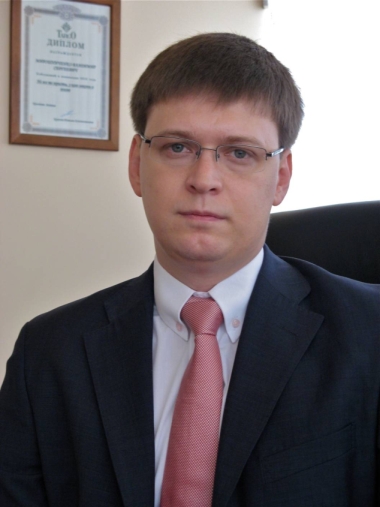WILL INVESTORS GO
FOR THE CUSTOMS UNION?

| BUSINESS MIR, Business mir #20 - 2011-10 | | MAIL PRINT |
The Customs Union linking Russia, Kazakhstan and Belarus has become reality. The approximately 170 million people, more than $2 trillion in GDP as well as the emerging common market of goods, labour and capital the Customs Union comprises give its supporters much to be proud of... Vladimir Miroshnichenko, head of the Legal Department at customs holding operation Targo Group, explained what the change means for investors in an interview with Business Mir.
Photo: Vladimir Miroshnichenko, head of the Legal Department at customs holding operation Targo Group (DR) What should investors know if they decide to do business in the Customs Union (CU)? Investment decisions involving imports of technological equipment in the CU naturally lead investors to consider minimising costs as much as possible. Import duties in the CU’s new Unified Customs Tariff have been set for a small number of items, including industrial equipment. In so far as import duties are generally concerned, the current situation can be deemed quite positive. But there is a fly in the ointment. In addition to customs duty, importing technological equipment also entails paying value added tax. Establishing rates, order and timing of payments is the province of national legislation set by individual CU member countries. In Russia, the basic VAT rate – including costs applicable to equipment imports – stands at 18% whereas in Belarus it is 20% and is just 12% in Kazakhstan.
But aren’t investors granted discounts in paying VAT? Although discounts may be granted, they are subject to a massive list of conditions and requirements. In principle, complying with the policy of paying VAT at customs means that the investor can deduct fees at a later point. But the long-term engagement of funds remains inevitable. In Russia, the Russian Federation Government Resolution of April 30, 2009 №372 allows this tax burden to be partially eased. The resolution decrees importing various items of technological equipment that are not manufactured in Russia is not subject to VAT within the nation’s borders.
And how does the situation look for CU partners? Kazakhstan has also enacted a government decision to allow importing equipment included in a corresponding list which generates tax deductions. In fact, as the VAT payments are deducted from tax costs, the shipment is actually tax exempt. Contrary to Russia however, Kazakhstan imposes fixed restrictions on the use and distribution of VAT exempt goods as importers can only bring them in for their own use. Belarus’ legislation has no such provisions, although a presidential decree issued on June 13, 2001 №16, allows deferral of VAT payments for one year on technological equipment and spare parts if they are imported at a 0% customs duty rate.
What other possibilities for minimising investors’ costs – aside from tax policies – are included in CU legislation regarding customs? It is common knowledge that producing complex industrial equipment is a lengthy process. Therefore, it is optimal that delivery of equipment be organised in phases over a sufficiently long period of time. At the forefront of the issue are matters such as classifying equipment components, the potential for formalising all the components at the lowest possible customs duty rate as well as facilitating the process and minimising delays in customs clearance. In order to do this, there is a way of obtaining preliminary decisions from the Federal Customs Service on the classification of goods. If the equipment in question is not oversized and its transfer to customs clearance can be made within the temporary storage of goods deadline period, it's reasonable to assume that a prior classification decision will be obtained in accordance with the Administrative Regulations of Federal Customs which came into effect on March 24, 2011. But if the manufacturing process and equipment supply extends over a longer period of time, then one should be guided by on the general procedure of classification in accordance with the Commodity Nomenclature of Foreign Economic Activity of the Customs Union. This entails the need to declare pieces of equipment individually, classifying the items into sub-categories in their respective categories. And that means paying import duties as well as having to provide numerous documents confirming compliance with the restrictions on each delivery. There's a loophole here as well. Customs legislation provides the following option – if heavy industrial equipment is delivered in a phased manner over a set period of time, it can be classified by a single code through the Nomenclature of Foreign Economic Activity of the Customs Union to obtain the corresponding classification decision. A similar procedure has been in effect in Russia since 2001. In these cases, a special declaration procedure is applicable based on the corresponding classification decision. Said equipment is then declared by an application for conditional release of each piece of industrial equipment and payment of customs duties on them is guaranteed. The main advantage here is that once the final declaration is filed and customs values are determined, customs duties need only be paid after completion of all the deliveries concerned.
What provisions have the national legislations of other CU member countries made in respect to importing heavy equipment? At this point in time, the laws of all CU member countries allow one to declare major equipment supplied by importers under a single code of Commodity Nomenclature for Foreign Economic Activity of the Customs Union. Generally speaking, the current situation regarding large, technological equipment imports and customs regulations to Russia can be considered positive. But it remains wisest to rely on an experienced customs consulting company that supplies a comprehensive range of services for projects involving equipment imports. But that's another story...
| BUSINESS MIR, Business mir #20 - 2011-10 | 



| MAIL PRINT |













